Samsung MAX-VB450 User Manual
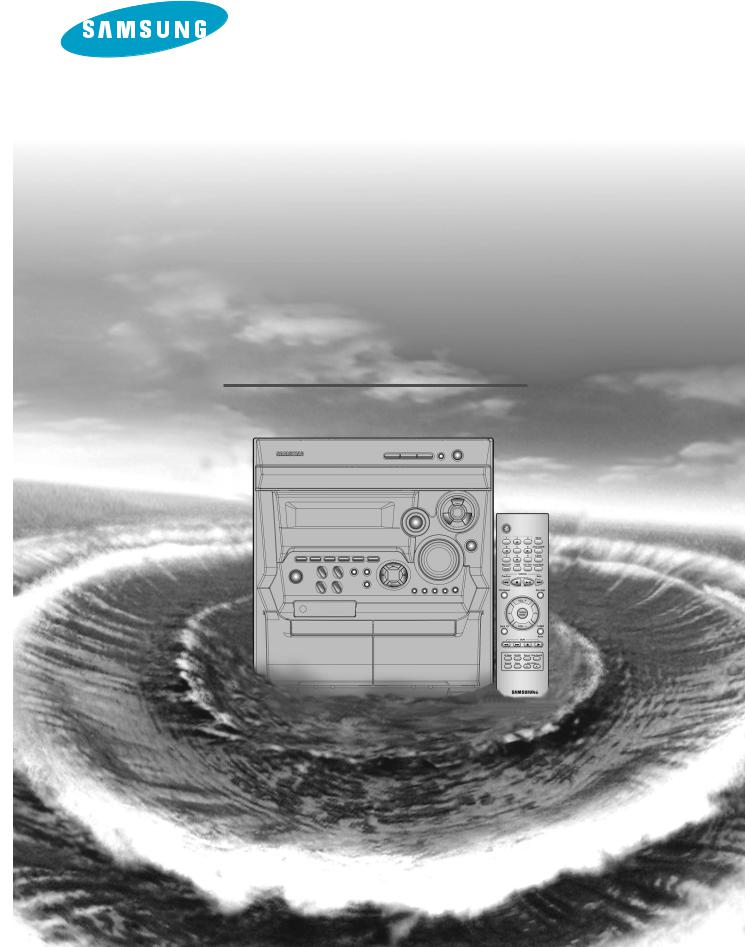
THREE-CD CHANGER VIDEO-CD MINI-COMPACT SYSTEM
MP3-CD/CD-R/RW PLAYBACK
MAX-VB450
Instruction Manual
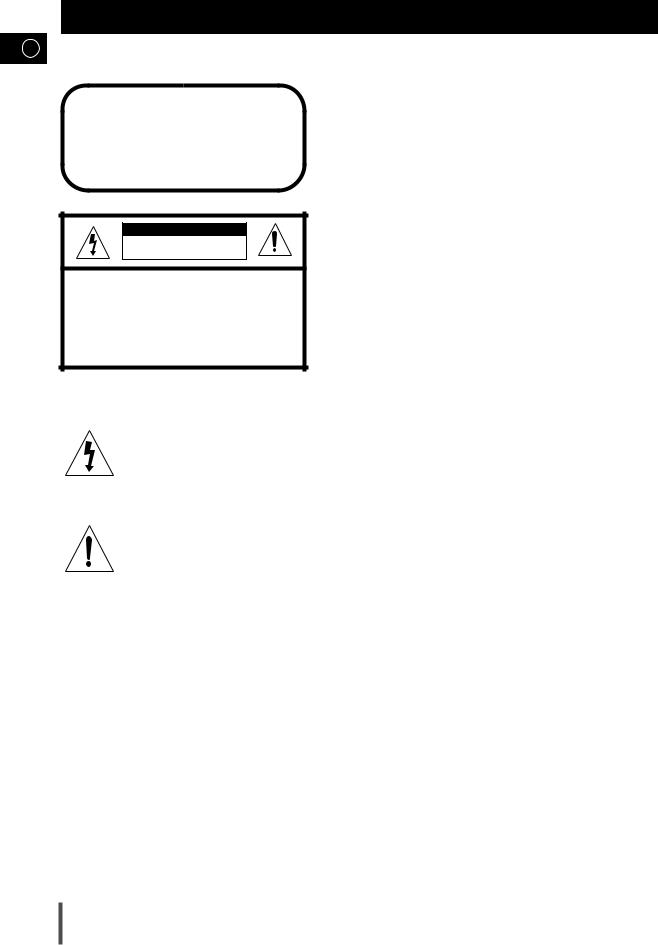
Safety Warnings
GB
CLASS 1 LASER PRODUCT
KLASSE 1 LASER PRODUKT
LUOKAN 1 LASER LAITE
KLASS 1 LASER APPARAT
PRODUCTO LASER CLASE 1
CAUTION
RISK OF ELECTRIC SHOCK.
DO NOT OPEN
CAUTION:
TO REDUCE THE RISK OF ELECTRIC SHOCK, DO NOT REMOVE REAR COVER. NO USER SERVICEABLE PARTS INSIDE. REFER SERVICING TO QUALIFIED SERVICE PERSONNEL.
CLASS 1 LASER PRODUCT
This Compact Disc player is classified as a CLASS 1 LASER product.
Use of controls, adjustments or performance of procedures other than those specified herein may result in hazardous radiation exposure.
CAUTION-INVISIBLE LASER RADIATION WHEN OPEN AND INTERLOCKS DEFEATED, AVOID EXPOSURE TO BEAM.
voltage which can cause electric shock is present inside
operating and maintenance instructions accompanying
shock, do not expose this appliance to rain or moisture.
MATCH WIDE BLADE OF PLUG TO WIDE SLOT, FULLY
2

|
|
|
|
|
Thank you for buying this |
|
Contents |
|
|
SAMSUNG mini-compact system. |
|
||
|
|
Please take time to read these instructions. |
|
|||
|
|
|
|
|
They will allow you to operate your |
|
|
|
|
|
|
system with ease and take full advantage |
GB |
|
|
SAFETY WARNINGS |
|
|
of its features. |
|
|
|
|
|
2 |
|
|
|
||||||
|
|
INSTALLING YOUR MINI-COMPACT SYSTEM |
|
|
|
|
|
|
Front Panel View |
4 |
|
||
|
|
|
||||
|
|
|
||||
|
|
Remote Control |
5 |
|
||
|
|
|
||||
|
|
|
||||
|
|
Rear Panel View |
6 |
|
||
|
|
|
||||
|
|
|
||||
|
|
Where to Install Your Mini-Compact System |
7 |
|
||
|
|
|
||||
|
|
|
||||
|
|
Connecting your System to the Power Supply |
7 |
|
||
|
|
|
||||
|
|
|
||||
|
|
Inserting Remote Control Batteries |
7 |
|
||
|
|
|
||||
|
|
|
||||
|
|
Connecting to an External Source |
8 |
|
||
|
|
|
||||
|
|
|
||||
|
|
Connecting the Loudspeakers |
8 |
|
||
|
|
|
||||
|
|
|
||||
|
|
Connecting the AM (MW)/LW Aerial |
9 |
|
||
|
|
|
||||
|
|
|
||||
|
|
Connecting the FM Aerial |
9 |
|
||
|
|
|
||||
|
|
|
||||
|
|
Connecting the SW Aerial(Option) |
9 |
|
||
|
|
|
||||
|
|
|
||||
|
|
Connecting the equipment |
9 |
|
||
|
|
|
||||
|
|
|
||||
|
|
Demo/Dimmer function |
10 |
|
||
|
|
|
||||
|
|
|
||||
|
|
Setting the Clock |
10 |
|
||
|
|
|
||||
|
|
|
||||
|
|
VCD/CD-PLAYER |
|
|
|
|
|
|
Loading and Changing Compact Discs |
11 |
|
||
|
|
|
||||
|
|
|
||||
|
|
To replay the CD/MP3-CD |
11 |
|
||
|
|
|
||||
|
|
|
||||
|
|
Selecting a CD in the Disc changer |
12 |
|
||
|
|
|
||||
|
|
|
||||
|
|
MP3-CD Playback |
12 |
|
||
|
|
|
||||
|
|
|
||||
|
|
Selecting a Track |
13 |
|
||
|
|
|
||||
|
|
|
||||
|
|
Searching for a Specific Music Passage on a CD |
13 |
|
||
|
|
|
||||
|
|
|
||||
|
|
Function to skip through 10 tracks at a time |
13 |
|
||
|
|
|
||||
|
|
|
||||
|
|
Shuffle Play Function |
14 |
|
||
|
|
|
||||
|
|
|
||||
|
|
Repeating One or All Tracks on the Compact Discs |
14 |
|
||
|
|
|
||||
|
|
|
||||
|
|
Programming the Order of Playback |
15 |
|
||
|
|
|
||||
|
|
|
||||
|
|
Checking or Changing Programmed Tracks |
15 |
|
||
|
|
|
||||
|
|
|
||||
|
|
Video CD Player Playback |
16 |
|
||
|
|
|
||||
|
|
|
||||
|
|
Search Functions |
16 |
|
||
|
|
|
||||
|
|
|
||||
|
|
When adjusting play speed |
17 |
|
||
|
|
|
||||
|
|
|
||||
|
|
NTSC/PAL Selection Method |
17 |
|
||
|
|
|
||||
|
|
|
||||
|
|
Sound Select Function |
17 |
|
||
|
|
|
||||
|
|
|
||||
|
|
KEY CONTROL Function |
17 |
|
||
|
|
|
||||
|
|
|
||||
|
|
VCD View Function |
18 |
|
||
|
|
|
||||
|
|
|
||||
|
|
ZOOM Function |
18 |
|
||
|
|
|
||||
|
|
|
||||
|
|
Last Memory Function |
18 |
|
||
|
|
|
||||
|
|
|
||||
|
|
TUNER |
|
|
|
|
|
|
Searching for and Storing the Radio Stations |
19 |
|
||
|
|
|
||||
|
|
|
||||
|
|
Selecting a Stored Station |
19 |
|
||
|
|
|
||||
|
|
|
||||
|
|
Improving Radio Reception |
19 |
|
||
|
|
|
||||
|
|
|
||||
|
|
TAPE DECK |
|
|
|
|
|
|
Listening to a Cassette |
20 |
|
||
|
|
|
||||
|
|
|
||||
|
|
CD Synchro Record Feature |
20 |
|
||
|
|
|
||||
|
|
|
||||
|
|
Recording a Compact Disc |
20 |
|
||
|
|
|
||||
|
|
|
||||
|
|
Recording a Radio Programme |
21 |
|
||
|
|
|
||||
|
|
|
||||
|
|
Copying a Cassette (Dubbing) |
21 |
|
||
|
|
|
||||
|
|
|
||||
|
|
Tape Counter |
21 |
|
||
|
|
|
||||
|
|
|
||||
|
|
OTHER FUNCTIONS |
|
|
|
|
|
|
Timer Function |
22 |
|
||
|
|
|
||||
|
|
|
||||
|
|
Cancelling the Timer |
23 |
|
||
|
|
|
||||
|
|
|
||||
|
|
Mute Function |
23 |
|
||
|
|
|
||||
|
|
|
||||
|
|
Selecting an Equalizer Preset |
23 |
|
||
|
|
|
||||
|
|
|
||||
|
|
Power Sound Function |
23 |
|
||
|
|
|
||||
|
|
|
||||
|
|
Setting the System to Switch off Automatically |
24 |
|
||
|
|
|
||||
|
|
|
||||
|
|
Super Bass Sound |
24 |
|
||
|
|
|
||||
|
|
|
||||
|
|
Connecting Headphones |
24 |
|
||
|
|
|
||||
|
|
|
||||
|
|
Microphone Function |
24 |
|
||
|
|
|
||||
|
|
|
||||
|
|
RECOMMENDATIONS FOR USE |
|
|
|
|
|
|
Safety Precautions |
25 |
|
||
|
|
|
||||
|
|
|
||||
|
|
Cleaning Your Mini-Compact System |
25 |
|
||
|
|
|
||||
|
|
|
||||
|
|
Precautions When Using Compact Discs |
26 |
|
||
|
|
|
||||
|
|
|
||||
|
|
Precautions When Using Audio Cassettes |
26 |
|
||
|
|
|
||||
|
|
|
||||
|
|
Before Contacting the After-Sales Service |
26 |
|
||
|
|
|
||||
|
|
|
||||
|
|
Technical Specifications |
27 |
|
||
|
|
|
||||
|
|
|
||||
Press |
Push |
Important |
Note |
3 |
|
|
|
|
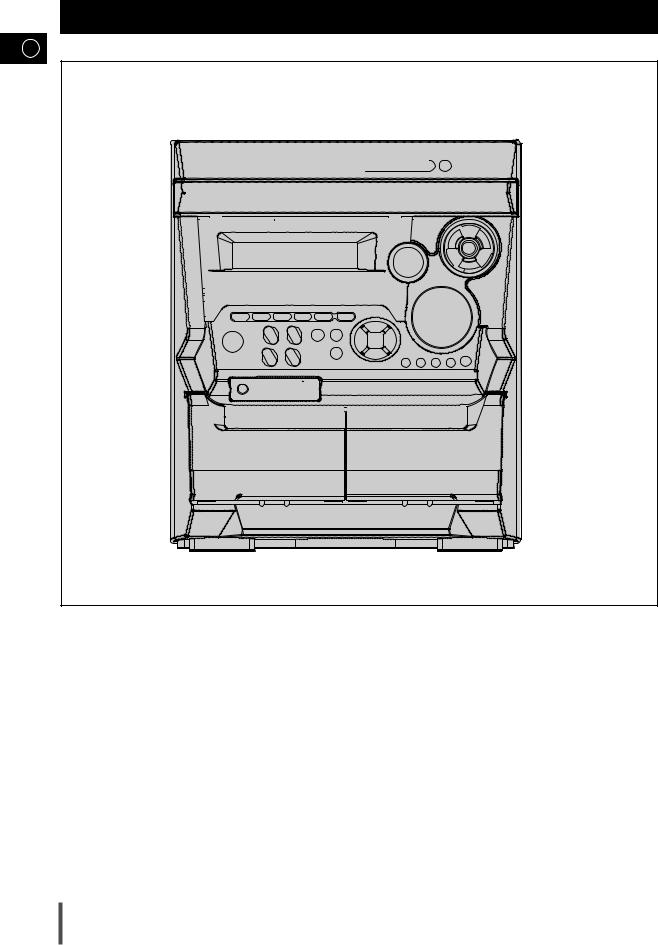
Front Panel View
GB
|
|
|
|
34 |
33 |
32 |
|
|
|
|
|
|
31 |
|
|
|
|
|
|
30 |
1 |
|
|
|
|
|
29 |
2 |
|
|
|
|
|
28 |
3 |
|
|
|
|
|
|
4 |
|
|
|
|
|
27 |
5 |
|
|
|
|
|
26 |
6 |
|
|
|
|
|
25 |
7 |
|
|
|
|
|
24 |
8 |
|
|
|
|
|
23 |
9 |
|
|
|
|
|
22 |
|
|
|
|
|
|
|
10 |
|
|
|
|
|
21 |
11 |
|
|
|
|
|
20 |
|
|
|
|
|
|
|
12 |
|
|
|
|
|
|
13 |
|
|
|
|
|
19 |
14 |
15 |
16 |
17 |
18 |
|
|
1. |
Enter |
19. |
Cassette Deck 2 |
2. |
Window Display |
20. |
REC/Pause(PAL/NTSC) |
3. |
Program |
21. |
TAPE Normal Dubbing |
4. |
CD Repeat |
22. |
CD Synchro Recording |
5. |
Timer/Clock |
23. |
Counter Reset |
6. |
AI Sleep |
24. |
Skip Function buttons |
7. |
Timer On/Off |
25. |
Volume |
8. |
Standby/On |
26. |
S.Bass |
9. |
Function Selection buttons |
27. |
Power Sound |
10. |
Headphone Jack Connector |
28. |
EQ Preset Rock |
11. |
MIC Volume |
29. |
EQ Preset Classic |
12. |
MIC Jack |
30. |
EQ Preset Pop |
13. |
Cassette Deck 1 |
31. |
Compact Disc Compartment |
14. |
Demo/Dimmer |
32. |
VCD/CD Open/Close |
15. |
Stop button |
33. |
Disc Change |
16. |
Mono/ST. |
34. |
Disc Selection buttons |
17.Search Function buttons
18.Deck 1/2
4
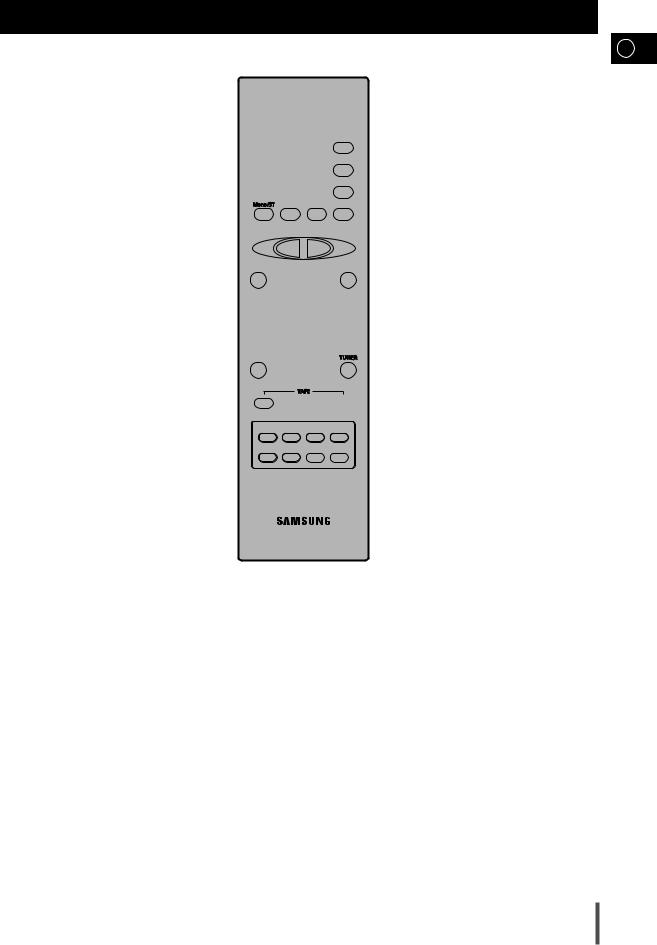
Remote Control
GB
1 |
|
|
33 |
2 |
32 |
|
31 |
3 |
30 |
4 |
29 |
5 |
28 |
6 |
27 |
7 |
26 |
8 |
25 |
|
|
|
24 |
9 |
|
10 |
23 |
11 |
22 |
12 |
21 |
13 |
20 |
14 |
19 |
15 |
18 |
16 |
17 |
1. |
Standby/On |
18. |
Key Control |
2. |
Digit Buttons/Direction Buttons |
19. |
Return |
3. |
FM Mono/Stereo/ VCD Zoom |
20. |
Time Search (Last Memory) |
4. |
+10/0 |
21. |
TAPE Stop |
5. |
Track Previous |
22. |
TAPE Play |
6. |
VCD/CD Stop |
23. |
Tuner/Band |
7. |
CD Repeat |
24. |
Tuning Mode |
8. |
Radio Station Search |
25. |
Volume Increase |
9. |
Volume Decrease |
26. |
Disc Number Skip |
10. Deck 1/2 |
27. |
Disc Play/Pause |
|
11. |
TAPE Rewind |
28. |
Track Next |
12. |
TAPE Fast-Forward |
29. |
Disc View |
13. |
AI Sleep |
30. |
Sound Mode |
14. |
VCD/CD Shuffle Play/MP3-CD Random |
31. |
S.BASS |
|
Play |
32. |
Timer On/Off |
15. VCD Sound |
33. |
Mute |
|
16.VCD Slow Play
17.Key Control 
5

Rear Panel View
GB
|
|
|
1 |
|
|
|
2 |
|
|
|
3 |
|
|
|
4 |
8 |
7 |
6 |
5 |
1.FM Aerial Connector Terminal
2.AM Aerial Connector Terminals
3.AUX-Input
4.Loudspeaker Connector Terminals
5.Voltage Selector(option)
6.SW Aerial Connector Terminal(option)
7.Audio (DISC) Output
8.Video (DISC) Output
6

Where to Install Your
Mini-Compact System
To take full advantage of your new mini-compact system, follow these installation instructions before connecting the unit.
 Install the system on a flat, stable surface.
Install the system on a flat, stable surface.
 Never place this unit on carpeting.
Never place this unit on carpeting.
 Never place this unit in an outdoor area.
Never place this unit in an outdoor area.
 Maintain an open space of approximately 6 inches (15 cm) on the sides and rear of the system, for ventilation purposes.
Maintain an open space of approximately 6 inches (15 cm) on the sides and rear of the system, for ventilation purposes.
 Make sure that you have enough room to open the compact disc compartment easily.
Make sure that you have enough room to open the compact disc compartment easily.
 Place the loudspeakers at a reasonable distance on either side of the system to ensure good stereo sound.
Place the loudspeakers at a reasonable distance on either side of the system to ensure good stereo sound.
 Direct the loudspeakers towards the listening area.
Direct the loudspeakers towards the listening area.
 For optimum performance, make sure that both speakers are placed at an equal distance above the floor.
For optimum performance, make sure that both speakers are placed at an equal distance above the floor.
Connecting your System to the Power Supply
The main lead must be plugged into an appropriate socket.
 Before plugging your system into a main socket, you must check the voltage.
Before plugging your system into a main socket, you must check the voltage.
1 Check the position of the voltage selector on the rear of the system (OPTIONAL).
2 Plug the main lead (marked AC Cord on the rear of the system) into an
appropriate socket.
3 Press the Standby/On button to switch your mini-compact system on.
Inserting Remote Control Batteries
GB
Insert or replace remote control batteries when you:
 Purchase the mini-compact system
Purchase the mini-compact system
 Find that the remote control is no longer operating correctly
Find that the remote control is no longer operating correctly
 When replacing the batteries, use a new set of batteries and never mix alkaline and manganese batteries.
When replacing the batteries, use a new set of batteries and never mix alkaline and manganese batteries.
1 |
Place your thumb on the position marked |
on the battery |
|
compartment cover (rear of the remote control) and push the cover in |
|
|
the direction of the arrow. |
|
2 |
Insert two AA, LR6 or equivalent batteries, taking care to respect the |
|
|
polarities: |
|
|
+ on the battery against + in the battery compartment |
|
|
– on the battery against – in the battery compartment |
|
3 |
Replace the cover by sliding it back until it clicks into position. |
|
 If you will not be using the remote control for a long time, remove the batteries to prevent corrosion.
If you will not be using the remote control for a long time, remove the batteries to prevent corrosion.
7
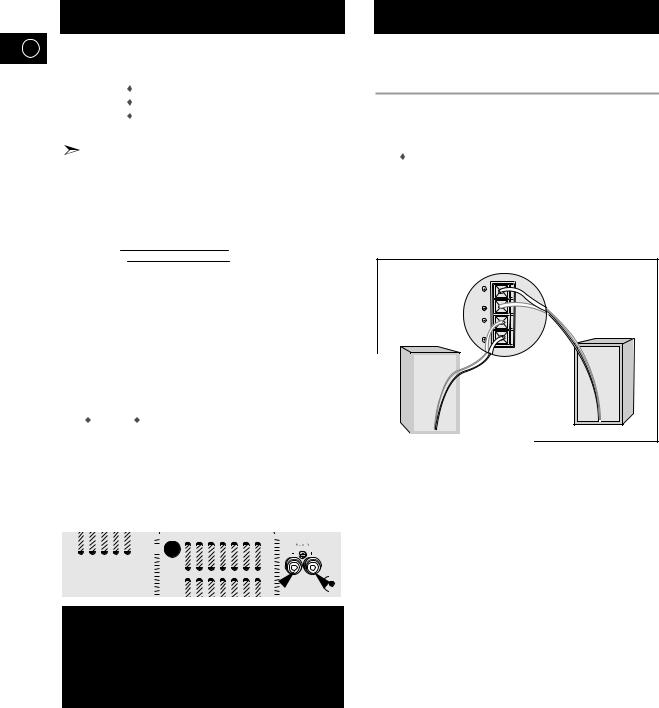
Connecting to an External Source
GB
The auxiliary input can be used to take advantage of the sound quality of your mini-compact system when listening to other sources.
|
Examples: A television |
|
|
A video disc player |
|
|
A Hi-Fi stereo video cassette recorder |
|
|
To connect the external source, the source must have an audio out- |
|
|
put. In addition, you need an RCA connection cable. |
|
|
|
|
1 |
Set the system to standby mode and disconnect it and the external |
|
|
source from the main. |
|
2 |
Connect the audio cable to the rear of the mini-compact system. |
|
|
Connect the... |
To the connector marked... |
|
|
|
|
Red jack |
R (right) |
|
White jack |
L (left) |
 For optimum sound quality, do not invert the right and left
For optimum sound quality, do not invert the right and left
Connecting the Loudspeakers
The loudspeaker connector terminals are located on the rear of the system.
1 |
Press and hold the clamp of the speaker terminal on the rear of the |
|
unit. |
2 |
Insert the end of the speaker cord into the terminal. |
|
Match the polarity (colors): Red (+) to red (+) and black (–) to black |
|
(–). |
3 |
Release the finger from the clamp. |
|
|
 Use only speakers with the same speaker impedance as indicated by the speaker terminals on the rear of the unit.
Use only speakers with the same speaker impedance as indicated by the speaker terminals on the rear of the unit.
L
Directions in Installing Speaker
 Installation in a place near heating apparatus, under direct lay of light or with high humidity may cause performance degradation of the speaker.
Installation in a place near heating apparatus, under direct lay of light or with high humidity may cause performance degradation of the speaker.
 Do not install on the wall or on a high place of pole or other unstable place to prevent any safety accident caused by falling of the speaker.
Do not install on the wall or on a high place of pole or other unstable place to prevent any safety accident caused by falling of the speaker.
 Do not take the speaker apart from TV or computer monitor. The speaker near the TV or computer monitor may influence the quality of the screen display.
Do not take the speaker apart from TV or computer monitor. The speaker near the TV or computer monitor may influence the quality of the screen display.
8
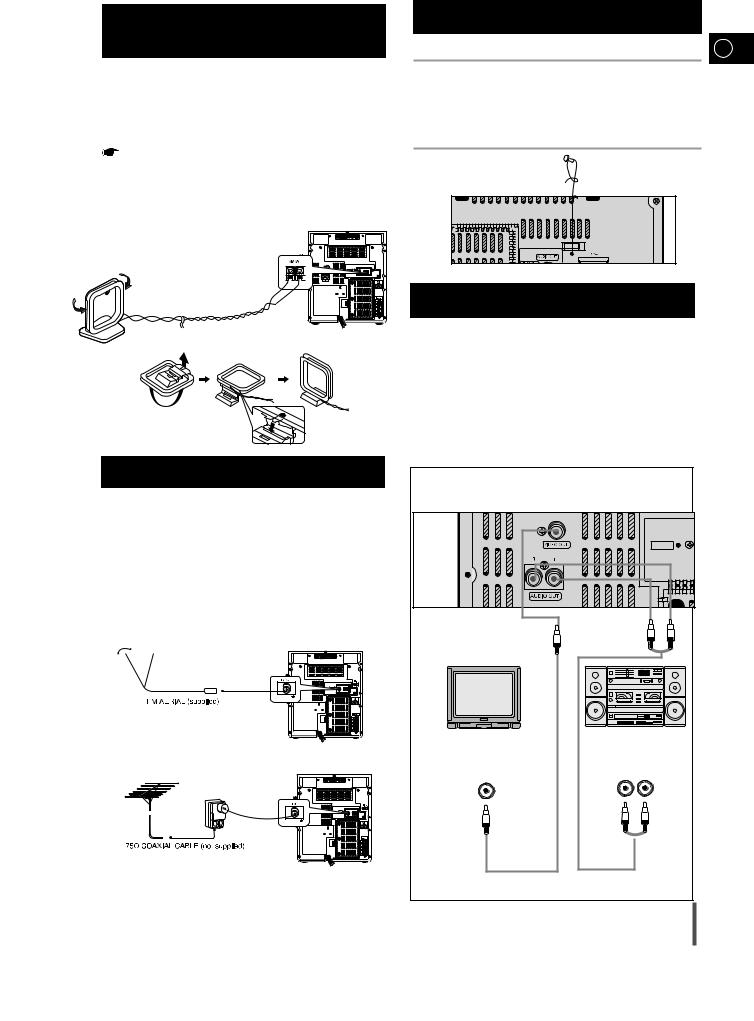
Connecting the AM (MW)/LW Aerial
The AM aerial (for long and medium waves) can be:
 Placed on a stable surface
Placed on a stable surface
 Fixed to the wall (you must first remove the base)
Fixed to the wall (you must first remove the base)
The AM aerial connector terminals are located on the rear of the system and are marked AM .
To avoid noise interference, check that the loudspeaker wires do not run close to the aerial wires.
Always keep them at least 2 inches (5 cm) away.
Connecting the FM Aerial
How to connect a COAXIAL TYPE aerial.
 Connect a 75Ω antenna to the FM antenna terminal.
Connect a 75Ω antenna to the FM antenna terminal.
 Plug the connector on the FM aerial supplied into the coaxial socket (75Ω) marked FM on the rear of the system.
Plug the connector on the FM aerial supplied into the coaxial socket (75Ω) marked FM on the rear of the system.
 Follow the instructions given on Page 19 to tune into a radio station, and determine the best position for the aerial.
Follow the instructions given on Page 19 to tune into a radio station, and determine the best position for the aerial.
 If reception is poor, you may need to install an outdoor aerial.
If reception is poor, you may need to install an outdoor aerial.
To do so, connect an outdoor FM aerial to the FM socket on the rear of the system using a 75Ω coaxial cable (not supplied).
Connecting the SW Aerial (option)
GB
How to connect a WIRE TYPE aerial.
 Spread the SW aerial out and attach the ends to a wall, in the position providing the best reception.
Spread the SW aerial out and attach the ends to a wall, in the position providing the best reception.
 If reception is poor (e.g. distance from transmitter too great, walls blocking the radio waves, etc.), install an outdoor aerial.
If reception is poor (e.g. distance from transmitter too great, walls blocking the radio waves, etc.), install an outdoor aerial.
SW ANT. |
Connecting to the Equipment
 Using the Audio Cord, Connect the Audio Output Terminals (Left, Right) of the System with the Audio Input Terminals (Left, Right) of the Video Input Cassette Recorder, so as to Record VCD.
Using the Audio Cord, Connect the Audio Output Terminals (Left, Right) of the System with the Audio Input Terminals (Left, Right) of the Video Input Cassette Recorder, so as to Record VCD.
 Using the Video Cord, Connect the Video Output Terminal of the system with the Video Input Terminal of TV.
Using the Video Cord, Connect the Video Output Terminal of the system with the Video Input Terminal of TV.
 Turn on the TV and Select the Video mode by pressing the TV/VIDEO SELECT button to the VIDEO Position.
Turn on the TV and Select the Video mode by pressing the TV/VIDEO SELECT button to the VIDEO Position.
 Please Pay Attention not to Connect the Audio Output Terminals (left, right) of the System with the Audio Input Terminal of TV.
Please Pay Attention not to Connect the Audio Output Terminals (left, right) of the System with the Audio Input Terminal of TV.
TV |
AMPLIFIER |
|
VIDEO INPUT |
AUDIO INPUT |
|
|
|
|
|
R |
L |
|
|
9 |
